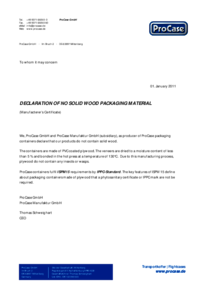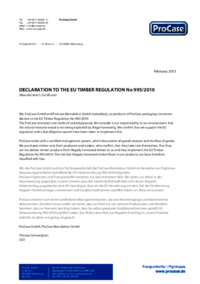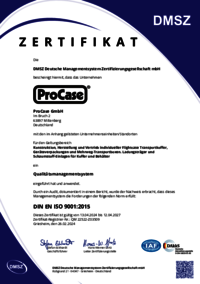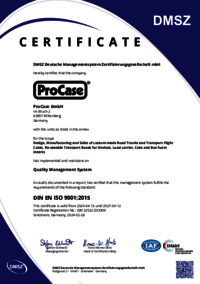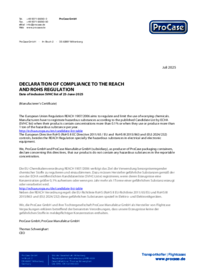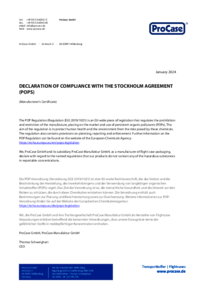Export Norm IPPC-ISPM15
The above export standard has in the meanwhile become the norm for exportability of wooden packing cases. Most countries in the world set their own import regulations along these lines. The export standard of IPPC- ISPM15 is designed to prevent the import of foreign insects into the native flora.
This means for many wooden cases an expensive insecticide procedure, long waiting times at borders or even an import ban. ProCase flight cases do not have this problem when being exported. ProCase flight cases are designed to fully conform with IPPC-ISPM15 and consist of so-called “processed wood”. The wooden materials used in the manufacture of ProCase system containers ensure full conformity with all the required standards and thus are not held up when crossing any frontier.
The ProCase containers are made of coated plywood. We consider it our responsibility to our environment that the natural resource wood is not being exploited by illegal harvesting. We confirm that we support the EU regulation and a due diligence system have been taken to implement this.
ProCase works with a certified management system, which documents all goods receipts and the flow of goods. We purchases timber only from producers and traders, who confirm, that they take care themselves, that they are not deliver timber products from illegally harvested timber to us and they implement the EU Timber Regulation No 995/2010. The risk that illegally harvested timber flows in our products, we have therefore classified with low.
Quality Management System according to DIN EN ISO 9001: 2015
Flight cases and transport cases from ISO certified manufacturer
ProCase is well known in the flight case industry as a long-standing and particularly reliable flight case manufacturer with top quality. Both the quality of the flight case and transport cases and the quality of our business processes, we strive to constantly improve at the highest level. Our quality management system according to DIN EN ISO 9001: 2015 documents our principles, objectives, business processes, occupational safety, quality assurance and continuous improvement. The ProCase QM system uses a particularly innovative integrated documentation system with a slim bureaucratic effort. Competence and knowledge strengthens our employees in order to offer you the best flight case packaging, handled reliably and produced in top quality. According to DIN ISO 9001 at ProCase.
ProCase as flight case manufacturer is certified according to DIN EN ISO
DQS GmbH (German Association for the Certification of Quality Management Systems) grants ProCase GmbH the certificate for a quality management system at ProCase according to DIN EN ISO 9001: 2015
In addition, ProCase is accredited by the international IQnet.
Scope of the ProCase ISO certificate
Design, manufacture and sale of individual flight case transport cases, equipment packaging and reusable transport boxes. Load carriers and foam inserts for suitcases and containers.
Certificate registration no. 498061 QM15.
The European Union Regulation REACH 1907/2006 aims to regulate and limit the use of worrying chemicals. Manufacturers have to registrate hazardous substances according to the published Candidate List by ECHA (SVHC list) when their products contain concentrations more than 0.1% or when they use or produce more than 1 ton of the hazardous substance per year.
http://echa.europa.eu/en/candidate-list-table The European Directive RoHS (RoHS II EC Directive 2011/65 / EU and RoHS III 2015/863) controls, besides the REACH Regulation specially the hazardous substances in electrical and electronic equipment.
EU Packaging Directive 94/62/EG
The European Directive 94/62/EC on Packaging and Packaging Waste and its subsequent amendment in Directive 2004/12/EC are designed to provide measures to prevent the production of packaging waste, to reduce packaging, its recycling and as result to reduce the disposal of final waste.
https://eur-lex.europa.eu/legal-content/EN/TXT/PDF/?uri=CELEX:01994L0062-20180704
POP Regulation (Regulation (EU) 2019/1021)
The POP Regulation (Regulation (EU) 2019/1021) is an EU-wide piece of legislation that regulates the prohibition and restriction of the manufacture, placing on the market and use of persistent organic pollutants (POPs). The aim of the regulation is to protect human health and the environment from the risks posed by these chemicals. The regulation also contains provisions on planning, reporting and enforcement.
PFAS Declaration of Conformity
ProCase is committed to acting in an environmentally conscious manner. Our flight cases and transport cases are free of PFAS - persistent chemicals that are suspected of being harmful to health. If we become aware that one of our suppliers' products contains PFAS, it will be replaced by a PFAS-free alternative. We also pay attention to the origin of our wood and support the EU Timber Regulation to combat illegal logging. We source wood exclusively from certified dealers who have demonstrated appropriate due diligence measures in accordance with EU Regulation 995/2010.
https://echa.europa.eu/hot-topics/perfluoroalkyl-chemicals-pfas



